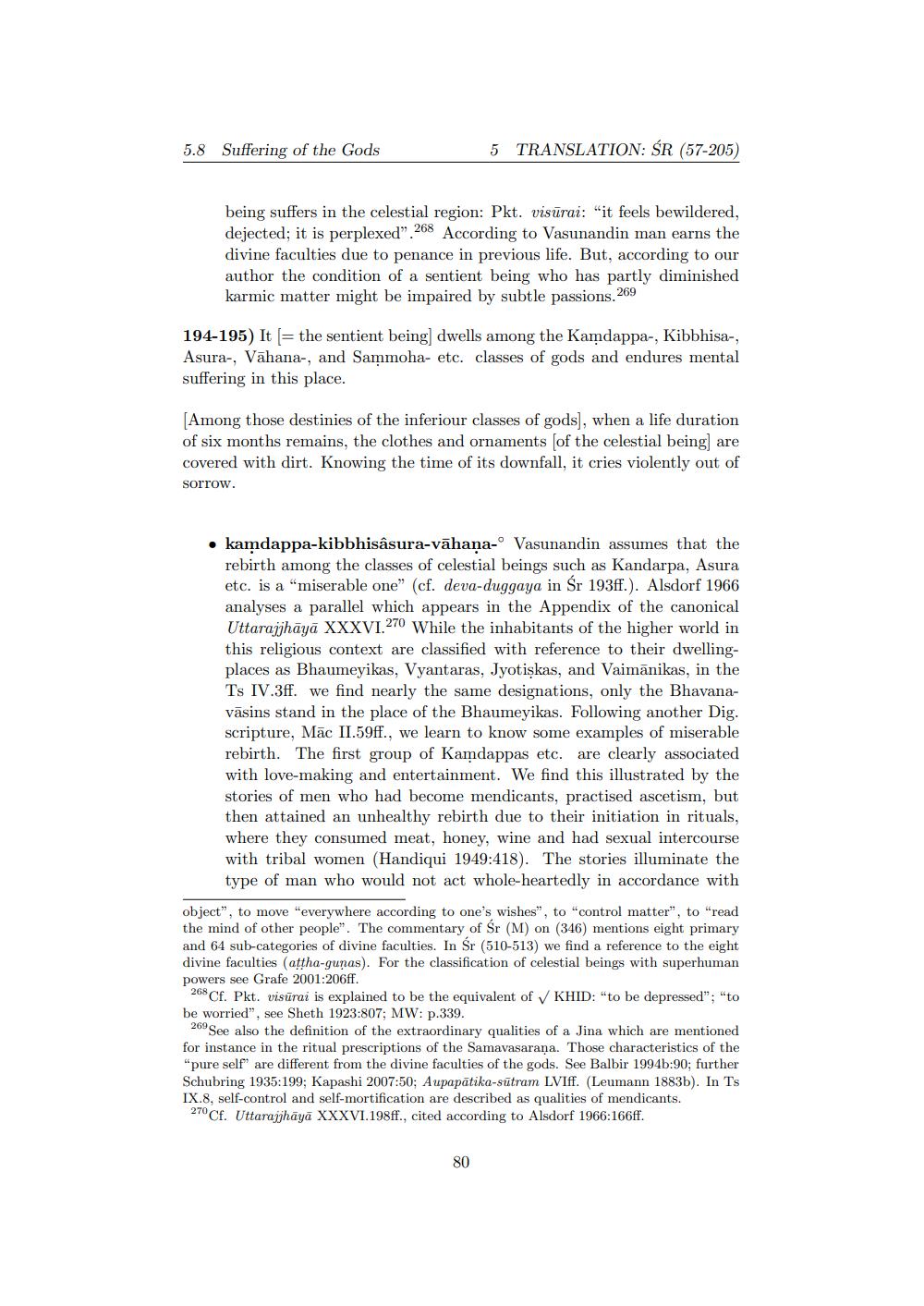________________
5.8 Suffering of the Gods
5
TRANSLATION: SR (57-205)
being suffers in the celestial region: Pkt. visurai: "it feels bewildered, dejected; it is perplexed”. 268 According to Vasunandin man earns the divine faculties due to penance in previous life. But, according to our author the condition of a sentient being who has partly diminished karmic matter might be impaired by subtle passions.269
194-195) It (=the sentient being] dwells among the Kamdappa-, Kibbhisa-, Asura-, Vāhana-, and Sammoha- etc. classes of gods and endures mental suffering in this place.
[Among those destinies of the inferiour classes of gods), when a life duration of six months remains, the clothes and ornaments of the celestial being) are covered with dirt. Knowing the time of its downfall, it cries violently out of sorrow.
• kamdappa-kibbhisâsura-vāhana-° Vasunandin assumes that the
rebirth among the classes of celestial beings such as Kandarpa, Asura etc. is a “miserable one" (cf. deva-duggaya in Śr 193ff.). Alsdorf 1966 analyses a parallel which appears in the Appendix of the canonical Uttarajjhāyā XXXVI.270 While the inhabitants of the higher world in this religious context are classified with reference to their dwellingplaces as Bhaumeyikas, Vyantaras, Jyotiskas, and Vaimānikas, in the Ts IV.3ff. we find nearly the same designations, only the Bhavanavāsins stand in the place of the Bhaumeyikas. Following another Dig. scripture, Māc II.59ff., we learn to know some examples of miserable rebirth. The first group of Kamdappas etc. are clearly associated with love-making and entertainment. We find this illustrated by the stories of men who had become mendicants, practised ascetism, but then attained an unhealthy rebirth due to their initiation in rituals, where they consumed meat, honey, wine and had sexual intercourse with tribal women (Handiqui 1949:418). The stories illuminate the type of man who would not act whole-heartedly in accordance with
object", to move "everywhere according to one's wishes”, to "control matter", to "read the mind of other people". The commentary of Sr (M) on (346) mentions eight primary and 64 sub-categories of divine faculties. In Sr (510-513) we find a reference to the eight divine faculties (attha-gunas). For the classification of celestial beings with superhuman powers see Grafe 2001:206ff.
268 Cf. Pkt. visurai is explained to be the equivalent of KHID: "to be depressed"; "to be worried”, see Sheth 1923:807; MW: p.339.
269 See also the definition of the extraordinary qualities of a Jina which are mentioned for instance in the ritual prescriptions of the Samavasarana. Those characteristics of the "pure self are different from the divine faculties of the gods. See Balbir 1994b:90; further Schubring 1935:199; Kapashi 2007:50: Aupapātika-sutram LVIff. (Leumann 1883b). In Ts IX.8, self-control and self-mortification are described as qualities of mendicants. 270 Cf. Uttarajihāyā XXXVI.198ff., cited according to Alsdorf 1966:166ff.
80




